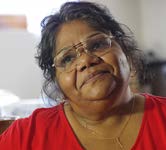
Now in its third year, the Flinders Closing the Gap Program has achieved significant milestones in delivering training and implementation of self-management support for Aboriginal and Torres Strait Islander people across Australia.
The successful uptake of the national program for self-management of chronic conditions by health organisations, health professionals and their clients across the country will be marked with an event at Flinders University Victoria Square on at 5.30pm on Tuesday, 3 September.
The event will also see the launch of new materials to support the program, with videos and posters to be launched by Dr Tom Calma, National Coordinator for Tackling Indigenous Smoking.
Funded by the Commonwealth Department of Health and Ageing under the ‘Closing the Gap’ in Indigenous Health Outcomes Initiative, the program aims to assist Aboriginal and Torres Strait Islander clients to better understand their health problems and to develop goals to help manage their conditions in partnership with health professionals.
The program’s Director, Professor Malcolm Battersby of Flinders University’s Human Behaviour and Health Research Unit, said a “wave of momentum” is steadily increasing the numbers of Indigenous clients using the program to improve their health and wellbeing.
“Since 2010, more than 800 health professionals and Aboriginal Health Practitioners in services across Australia have received training, and more than 40 people have been provided with additional training so that they can continue educating staff within their service and region in the program,” Professor Battersby said.
“This will ensure a succession of trained staff and the continuation of the program within a service.”
Since the initial rollout, Professor Battersby said there have also been extensive follow-ups to assist organisations with implementation and evaluation to sustain take-up in the long term. The program’s materials and questionnaires have also evolved to become more user-friendly to Indigenous clients.
The program was extended further in 2012 to include tobacco management, and saw the inception of the ‘Live Well, Smoke Free’ program.
Of the three videos to be launched, two feature fictional characters played by Aboriginal actors; one gives an overview of the program, while the second is dedicated to tobacco management training and strategies.
A third video features a real client of the Flinders Closing the Gap Program, Peter Rose, who describes the profound difference two years of the program has made to his life and well-being. The videos can be viewed here.
Celebrating the program’s achievements will be members of the National Advisory Group and members of the local Aboriginal and Torres Strait Islander community, as well as a range of people from the health and research sector.
For information on the program, visit www.flindersclosingthegapprogram.com


Fantastic! Self-management is the key to long-term success.
I have been lucky enough to have viewed these recents videos for the closing the gap program mentioned above. I was also fortunate to be on set for a couple of days of filming. Vida films (Cathy Beitz and Tracy Riddiford)did a fantastic job in writing and producing these short films which our University can proudly set to work. Vida films were also responsible for two documentaries screened on SBS in the last few years, ‘Ayen’s Cooking School for African Men’ (2009) and ‘The Graduate from Sudan’ (2010). Both of these documemtaries were about South Australia’s Sudanese community, and both have had a significant impact on the Sudenese community in Australia, as well as finding a place on our Australian Studies program here at Flinders. Well done once again Cathy and Tracy for providing our University with such rich resources!